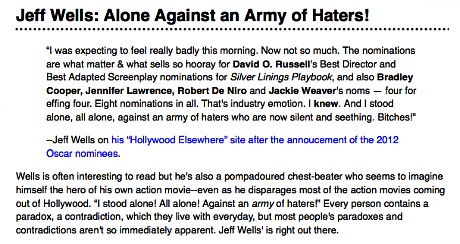I was expecting to feel really badly this morning. Now not so much. The nominations are what matter & what sells so hooray for David O. Russell‘s Best Director and Best Adapted Screenplay nominations for Silver Linings Playbook, and also Bradley Cooper, Jennifer Lawrence, Robert De Niro and Jackie Weaver‘s noms — four for effing four. Eight nominations in all. That’s industry emotion. I knew. And I stood alone, all alone, against an army of haters who are now silent and seething. Bitches!
Congratulations to the Queen of Oscar Land, Lisa Taback!!!
As I tweeted 14 minutes ago, “Lincoln will win Best Picture, but at least hard cases like N.Y. Post critic Lou Lumenick are actively pondering the highly unlikely fantasy of Silver Linings Playbook winning.”
I’m personally sorry for the sake of the Best Director snubbees: Argo‘s Ben Affleck, Zero Dark Thirty‘s Kathryn Bigelow. I guess that’s it for Argo and ZD30 as Best Picture contenders…but maybe not in the latter case. Congrats to Mark Boal for his Best Original Screenplay nomination, which (just guessing) he’ll probably win as a compensation for the Bigelow snub. I’ll obviously be delighted if ZD30 wins BP. But the Kathryn shutdown means the haters stopped enough people from voting for her.
Not sorry about Django‘s Quentin Tarantino being left out.
A surprised congrats to Beasts of the Southern Wild for its Best Picture nomination, and particularly its director, Benh Zeitlin, and lead actress, Quvenzhane Wallis.
Best motion picture of the year:
“Amour” Nominees to be determined
“Argo” Grant Heslov, Ben Affleck and George Clooney, Producers
“Beasts of the Southern Wild” Dan Janvey, Josh Penn and Michael Gottwald, Producers
“Django Unchained” Stacey Sher, Reginald Hudlin and Pilar Savone, Producers
“Les Misérables” Tim Bevan, Eric Fellner, Debra Hayward and Cameron Mackintosh, Producers
“Life of Pi” Gil Netter, Ang Lee and David Womark, Producers
“Lincoln” Steven Spielberg and Kathleen Kennedy, Producers
“Silver Linings Playbook” Donna Gigliotti, Bruce Cohen and Jonathan Gordon, Producers
“Zero Dark Thirty” Mark Boal, Kathryn Bigelow and Megan Ellison, Producers
Best Achievement in directing:
“Amour” Michael Haneke
“Beasts of the Southern Wild” Benh Zeitlin
“Life of Pi” Ang Lee
“Lincoln” Steven Spielberg
“Silver Linings Playbook” David O. Russell
Best Performance by an actor in a leading role:
Bradley Cooper in “Silver Linings Playbook”
Daniel Day-Lewis in “Lincoln”
Hugh Jackman in “Les Misérables”
Joaquin Phoenix in “The Master”
Denzel Washington in “Flight”
Best Performance by an actor in a supporting role:
Alan Arkin in “Argo”
Robert De Niro in “Silver Linings Playbook”
Philip Seymour Hoffman in “The Master”
Tommy Lee Jones in “Lincoln”
Christoph Waltz in “Django Unchained”
Best Performance by an actress in a leading role:
Jessica Chastain in “Zero Dark Thirty”
Jennifer Lawrence in “Silver Linings Playbook”
Emmanuelle Riva in “Amour”
Quvenzhané Wallis in “Beasts of the Southern Wild”
Naomi Watts in “The Impossible”
Best Performance by an actress in a supporting role:
Amy Adams in “The Master”
Sally Field in “Lincoln”
Anne Hathaway in “Les Misérables”
Helen Hunt in “The Sessions”
Jacki Weaver in “Silver Linings Playbook”
Best animated feature film of the year:
“Brave” Mark Andrews and Brenda Chapman
“Frankenweenie” Tim Burton
“ParaNorman” Sam Fell and Chris Butler
“The Pirates! Band of Misfits” Peter Lord
“Wreck-It Ralph” Rich Moore
Best Achievement in cinematography:
“Anna Karenina” Seamus McGarvey
“Django Unchained” Robert Richardson
“Life of Pi” Claudio Miranda
“Lincoln” Janusz Kaminski
“Skyfall” Roger Deakins
Best Achievement in costume design:
“Anna Karenina” Jacqueline Durran
“Les Misérables” Paco Delgado
“Lincoln” Joanna Johnston
“Mirror Mirror” Eiko Ishioka
“Snow White and the Huntsman” Colleen Atwood
Best documentary feature:
“5 Broken Cameras”
Emad Burnat and Guy Davidi
“The Gatekeepers”
Nominees to be determined
“How to Survive a Plague”
Nominees to be determined
“The Invisible War”
Nominees to be determined
“Searching for Sugar Man”
Nominees to be determined
Best documentary short subject:
“Inocente”
Sean Fine and Andrea Nix Fine
“Kings Point”
Sari Gilman and Jedd Wider
“Mondays at Racine”
Cynthia Wade and Robin Honan
“Open Heart”
Kief Davidson and Cori Shepherd Stern
“Redemption”
Jon Alpert and Matthew O’Neill
Best Achievement in film editing:
“Argo” William Goldenberg
“Life of Pi” Tim Squyres
“Lincoln” Michael Kahn
“Silver Linings Playbook” Jay Cassidy and Crispin Struthers
“Zero Dark Thirty” Dylan Tichenor and William Goldenberg
Best foreign language film of the year:
“Amour” Austria
“Kon-Tiki” Norway
“No” Chile
“A Royal Affair” Denmark
“War Witch” Canada
Best Achievement in makeup and hairstyling:
“Hitchcock”
Howard Berger, Peter Montagna and Martin Samuel
“The Hobbit: An Unexpected Journey”
Peter Swords King, Rick Findlater and Tami Lane
“Les Misérables”
Lisa Westcott and Julie Dartnell
Best achievement in music written for motion pictures (Original score)
“Anna Karenina” Dario Marianelli
“Argo” Alexandre Desplat
“Life of Pi” Mychael Danna
“Lincoln” John Williams
“Skyfall” Thomas Newman
Best Achievement in music written for motion pictures (Original song)
“Before My Time” from “Chasing Ice”
Music and Lyric by J. Ralph
“Everybody Needs A Best Friend” from “Ted”
Music by Walter Murphy; Lyric by Seth MacFarlane
“Pi’s Lullaby” from “Life of Pi”
Music by Mychael Danna; Lyric by Bombay Jayashri
“Skyfall” from “Skyfall”
Music and Lyric by Adele Adkins and Paul Epworth
“Suddenly” from “Les Misérables”
Music by Claude-Michel Schönberg; Lyric by Herbert Kretzmer and Alain Boublil
Best Achievement in production design:
“Anna Karenina”
Production Design: Sarah Greenwood; Set Decoration: Katie Spencer
“The Hobbit: An Unexpected Journey”
Production Design: Dan Hennah; Set Decoration: Ra Vincent and Simon Bright
“Les Misérables”
Production Design: Eve Stewart; Set Decoration: Anna Lynch-Robinson
“Life of Pi”
Production Design: David Gropman; Set Decoration: Anna Pinnock
“Lincoln”
Production Design: Rick Carter; Set Decoration: Jim Erickson
Best animated short film:
“Adam and Dog” Minkyu Lee
“Fresh Guacamole” PES
“Head over Heels” Timothy Reckart and Fodhla Cronin O’Reilly
“Maggie Simpson in “The Longest Daycare”” David Silverman
“Paperman” John Kahrs
Best live action short film:
“Asad” Bryan Buckley and Mino Jarjoura
“Buzkashi Boys” Sam French and Ariel Nasr
“Curfew” Shawn Christensen
“Death of a Shadow (Dood van een Schaduw)” Tom Van Avermaet and Ellen De Waele
“Henry” Yan England
Best Achievement in sound editing:
“Argo” Erik Aadahl and Ethan Van der Ryn
“Django Unchained” Wylie Stateman
“Life of Pi” Eugene Gearty and Philip Stockton
“Skyfall” Per Hallberg and Karen Baker Landers
“Zero Dark Thirty” Paul N.J. Ottosson
Best Achievement in sound mixing:
“Argo”
John Reitz, Gregg Rudloff and Jose Antonio Garcia
“Les Misérables”
Andy Nelson, Mark Paterson and Simon Hayes
“Life of Pi”
Ron Bartlett, D.M. Hemphill and Drew Kunin
“Lincoln”
Andy Nelson, Gary Rydstrom and Ronald Judkins
“Skyfall”
Scott Millan, Greg P. Russell and Stuart Wilson
Best Achievement in visual effects:
“The Hobbit: An Unexpected Journey”
Joe Letteri, Eric Saindon, David Clayton and R. Christopher White
“Life of Pi”
Bill Westenhofer, Guillaume Rocheron, Erik-Jan De Boer and Donald R. Elliott
“Marvel’s The Avengers”
Janek Sirrs, Jeff White, Guy Williams and Dan Sudick
“Prometheus”
Richard Stammers, Trevor Wood, Charley Henley and Martin Hill
“Snow White and the Huntsman”
Cedric Nicolas-Troyan, Philip Brennan, Neil Corbould and Michael Dawson
Best Adapted screenplay:
“Argo” Screenplay by Chris Terrio
“Beasts of the Southern Wild” Screenplay by Lucy Alibar & Benh Zeitlin
“Life of Pi” Screenplay by David Magee
“Lincoln” Screenplay by Tony Kushner
“Silver Linings Playbook” Screenplay by David O. Russell
Best Original screenplay:
“Amour” Written by Michael Haneke
“Django Unchained” Written by Quentin Tarantino
“Flight” Written by John Gatins
“Moonrise Kingdom” Written by Wes Anderson & Roman Coppola
“Zero Dark Thirty” Written by Mark Boal






